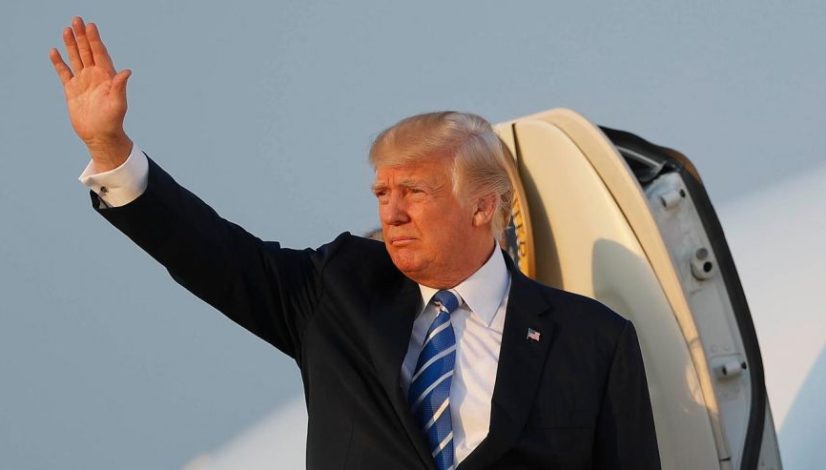Trump should go to Phoenix and pitch economic agenda & tax reform

The liberal media is unhappy that President Trump is going to hold a rally Tuesday night in Phoenix, Arizona. Of course they are. Every time Mr. Trump ventures out to speak to the country, he reminds people why they voted for him. His message of rejuvenation and promise to “Drain the Swamp!” still resonate, bigly.
Some have criticized the planned gathering as insensitive, coming so soon after the dreadful murder of Heather Heyer in Charlottesville. They are worried that Mr. Trump might reignite racial tensions, or do something provocative, like pardon Joe Arpaio, the controversial Arizona sheriff recently convicted of contempt.
Wouldn’t it be grand if he did something totally surprising, and pitched tax reform? Markets soared Tuesday in response to a piece in Politico that suggested progress on overhauling the nation’s tax system. This is important to the nation, and important to the president.
He can crow over a soaring stock market, accelerating growth, his numerous take-downs of Obama-era regulations, his administration’s vigorous enforcement of trade laws and then call for, or better yet, demand that Congress pass meaningful tax reform to help the nation’s middle class.
Trump should follow up his speech Monday night about sending more troops to Afghanistan – a speech in which he asked the country to promise our soldiers that when they return “they will find a country that has renewed the sacred bonds of love and loyalty that unite us together as one” – by committing to our soldiers coming home to find a booming economy and plentiful job openings as well.
He can crow over the progress to date: a soaring stock market, accelerating growth, his numerous take-downs of Obama-era regulations, his administration’s vigorous enforcement of trade laws and then call for, or better yet, demand that Congress pass meaningful tax reform to help the nation’s middle class.
This is not, however, a slam-dunk.
Let’s start with the inevitable Democrat resistance. Minority Leader Chuck Schumer offered to work with Republicans on tax reform as long as no relief goes to the top one percent, and only if the tax plan does not increase the country’s deficit.
Though few called him out on it, Schumer’s letter to the president outlining these demands, signed by all but three members of his caucus, essentially guaranteed no Dem support for tax reform. First, any sensible tax overhaul would include changing how small businesses are taxed. Currently, many private companies file as individuals, and are in the highest-earning bracket. There is widespread enthusiasm for reducing the tax burden on small firms, which are major job producers; a change would lead to the “top 1%”, as Schumer has described it, getting a break.
Also, Republicans are intent on repealing the estate tax, which would clearly benefit the wealthiest Americans, as would a reduction in the top capital gains rate to 20 percent from the current level of 23.8 percent. Schumer knows these are high priorities for the GOP.
The next bunch that could sideswipe reform would be the Freedom Caucus in the House, who view themselves as the protectors of the nation’s purse. Advancing a tax bill through reconciliation will require some sleight of hand, in order that the bill is scored as “revenue neutral,” or not increasing the deficit. The time horizon for that determination, now fixed at ten years, could be moved, or estimates of future economic growth might be raised. But, if the budget hawks in the House want to get ornery, they’ll have plenty of sticking points.
Then there are all the folks who will lose out under the emerging reform plan. To make the numbers work, some big tax breaks will have to go. State and local tax deductions are currently on the chopping block, which will enrage blue state residents, as is the expensing of corporate investments, a negative for capital equipment producers. The Big Six, as the masterminds behind the reform plan are called, is also considering a cap on mortgage interest deductions, probably targeting high earners, which will set the nation’s huge real estate industry howling.
Then there is the liberal media, which will be shocked that reduced taxes could benefit the wealthy, aka the people who pay most of the taxes.
But here’s what tax reform has going for it: a committed White House that has participated in drafting the proposal (unlike the various health care plans) and that is willing to go on the road and sell it to voters. One of the enormous failings of the push to repeal ObamaCare was the lack of an energetic messaging effort. This time round, the Big Six, which includes Ways & Means Chair Kevin Brady, Senate Finance Chair Orrin Hatch, Mitch McConnell, Paul Ryan, Steve Mnuchin and Gary Cohn, are united in the effort.
The push for tax reform will get a big assist from groups like American Action Network, which has committed to spending millions to promote what it has dubbed its “Middle-Class Growth Initiative.” In a press release, the group’s director said, “When it comes to tax reform, middle-class tax cuts and eliminating special interest loopholes should be Congress’ number one priority. American job creators also need a tax code that levels the playing field so they can compete and keep jobs from fleeing to countries like China.”
The group’s Corry Bliss added: “We will continue to urge Congress to put American families and job creators first, members who fail to do so will be held accountable. It’s past time for members of Congress to put politics aside and work together to deliver results that move our country forward.”
Could not have said it better. Maybe President Trump will – Tuesday night, in Phoenix.
Liz Peek is a writer who contributes frequently to FoxNews.com. She is a financial columnist who also writes for The Fiscal Times. For more visit LizPeek.com. Follow her on Twitter@LizPeek.
Published on Foxnews.com




